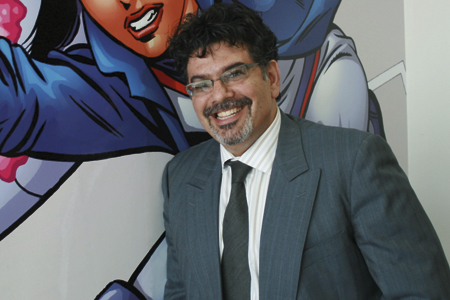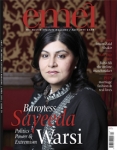
10 Questions with Dr Naif Al-Mutawa
Issue 79 April 2011
Award winning Kuwaiti psychologist and entrepreneur, Dr Naif Al-Mutawa, is creator of The 99—a series of superheroes based on the 99 attributes of God.
The 99 started as an idea in the back of a taxi in London’s Edgware Road. Very quickly the characters became a global phenomenon, and entered an arena dominated by Marvel and DC Comics. With an investment of $40m, The 99 is now a multi-million pound extravaganza of comics, merchandise, a theme park, and soon-to-be launched global TV show. And their creator has just won the World Economic Forum Young Global Leader 2011 Award.
1. To what extent is your success a product of your upbringing and background?
Only God knows the real answer between nature and nurture, but to be an entrepreneur in my region of the world, given all the restraints and the set-up, it is extremely challenging. Here, the focus is on how much money you have, not how good your ideas are. So, having a western higher education (including an MBA from the US) gave me an understanding of financial structures which is foreign here, and allowed me to navigate that part of my entrepreneurial life.
2. How did your parents influence you?
My mother is a philosophy teacher and my father was in business. He didn’t finish high school, so he didn’t know the limitations of education. That didn’t stop him from giving me a hard time for not finishing my fourth major when most students only managed one or two! He pushed, pushed and pushed; I was the good son that did, did and did. I ended up with three masters degrees and a doctorate to my name. My mother was a double major and studied abroad, the first generation of Kuwaiti women to do so. Between the two of them, I got the drive from one and the yearning for education from the other.
3. Were you good at school?
I almost failed fourth grade, as I wasn’t interested in the books they gave me to read. But, I was a good, well-behaved, diligent student; not necessarily the one with the best grades. I was third in the advanced maths class, but the first and second placed students—a Syrian and an Iranian—were way beyond anything I could comprehend. Their mathematic equations were mesmerising, more advanced than anything I could understand.
4. What was your biggest break and was there any luck involved?
Absolutely. The New York Times interviewed me in early December 2005 after I pitched a story to a journalist. He promised me a small paragraph in the Arts section at some future time; after all, Islam and comics were not exactly an exciting mix. Six weeks later, the world erupted with the Danish cartoon controversy, and Islamic cartoons became a bombshell of a story. Everyone wanted to know. There then followed a four-page article in The Sunday Times right in the middle of the cartoon controversy. Anybody Googling ‘Islam’ and ‘cartoon’ got me! And they all wanted to know my opinion on the matter. This was great publicity, but it was sheer luck; pure qadr. You couldn’t plan anything like that or even pay for it. Then we were covered by the worldwide media which was unprecedented, especially as the comics were still six months away from publication.
5. What has been your biggest failure and how did you recover?
I’ve made many mistakes. I tried to second-guess what I would need. I started buying western licences for Marvel and DC comics in Arabic—to legitimise what I was doing, to make The 99 more credible. But these were bad business decisions and we lost a lot of money. Also, when I was raising funds the second time round, I took my eye off the ball, so some of the stories of The 99 became too violent for my taste; the clothing became a bit too tight. Since then I have changed that. I realise now that I should have handed over some of my functions to professional people at a much earlier stage.
Mentors are very important to me; I always ask for advice before I do anything. In my 20s, when I was writing books for children, my ego got in the way—I wasn’t willing to change a few words in one of my books that would have made it a greater success. The lesson I learnt was to always be clear of your objectives.
The best advice I got was from a relative; she looked at my writing and said, “This is absolutely brilliant, Naif, but who are you writing for? For yourself?” I looked at her uncomprehendingly. I may have been flexing my literary muscles, but I was not getting my message across because I was not writing in a language people could digest. What’s the point in that? Be the thinker, not the implementer. So, with The 99 I am no longer the writer. I set the pace; have the ideas, the themes, the archetypes. But I leave the actual writings to professionals whom I supervise.
6. What can others learn from your success?
In my region of the world, you should never ask for permission but you always ask for forgiveness. Just do it, and then get on with it. I took three of my five boys to India to see the animation of the movie in a playhouse. It was amazing! I told my boys, “Anything is possible. Don’t let anyone limit your possibilities.” The 99 went from an idea in a taxi to attracting $40m in financing; creating nearly 1,000 jobs; and is going on global TV. It has made a mark on the way people perceive Islam.
7. Who are your heroes in life?
All heroes have a downside, but when I was growing up, I loved the Beatles; I was infatuated with the idea that art could change the world, that their wonderful words would contribute towards this. I had a mentor who died a year and a half ago. We opened a clinic with 24 therapists, and raised the standard in the whole area, without inceasing costs to patients; it is the largest private mental health clinic in the region. He was very wealthy, but for 25 years he treated patients free of charge when he could’ve been on a yacht in the South of France. He did this because he cared.
8. What’s the greatest pleasure you have had from your success?
I am a nerd at heart—I love ideas and books. At least half a dozen theses and journals have been written about The 99. A professor told me how at a conference where Hegel and Kierkegaard were being discussed, the opening paper was about the thinking behind The 99. This kind of stuff means a lot to me; I love watching the idea spread.
9. What are the greatest enemies of success?
Not giving others the credit. As the Gestaltist psychologists say, the whole is more than the sum of its parts. Together, in The 99 we are more than the 1,000 people. Anyone who says I am the reason for this success is wrong. Always be careful of mistaking luck for skill; this is very easy to do, especially if you have a big ego. Envy and jealousy are killers.
10. What would you say to people when it is time for you to leave this world?
Finding a job and feeding your family is a divine calling, but to be able to create jobs for others and to be able to do something that has a social dimension makes it all the more worthwhile. You should aspire for something where you’re not just counting the pennies, but doing something for the greater good.
Bookmark this |
|
Add to DIGG |
|
Add to del.icio.us |
|
Stumble this |
|
Share on Facebook |
|
Share this |
|
Send to a Friend |
|
Link to this |
|
Printer Friendly |
|
Print in plain text |
|


Comments
0 Comments